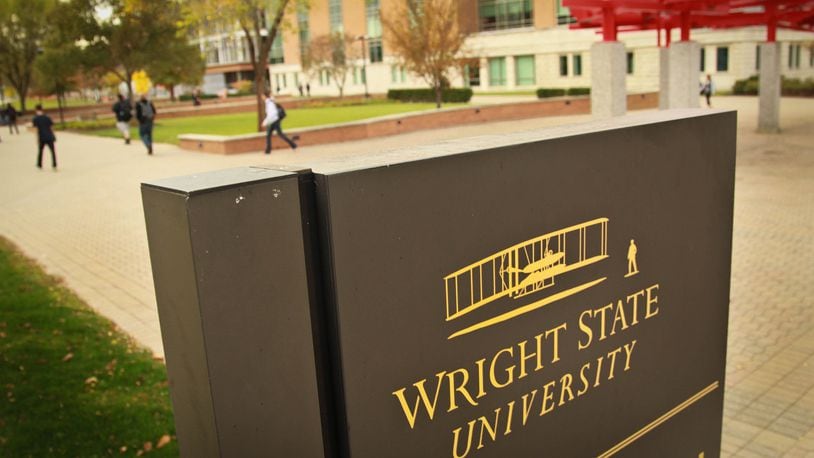Timeline of WSU’s hire of trustee chairman’s son
Jan. 16, 2015: David Bridges participates in a round of interviews at Wright State Research Institute.
Jan. 25, 2015: Dennis Andersh emails WSU President David Hopkins and then-provost Sundaram Narayanan asking if legal opinion should be sought. Narayanan says no.
Feb. 1, 2015: Andersh creates a new position and names David Bridges as "named in grant," referencing the umbrella WSARC grant, not new third-party funding that Bridges brought to the university.
Feb. 3, 2015: Andersh sends David Bridges an offer letter.
Feb. 11, 2015: Bridges separates from the Air Force.
March 2, 2015: Bridges begins work. Salary is set at $125,000.
May 1, 2015: WSU trustees vote to approve the hire of David Bridges and other employees. David's father, Michael Bridges, did not abstain from the vote. This was the same meeting where Michael Bridges, who has served on the board since 2012, was elected board president.
Aug. 31, 2015: David Bridges receives a satisfactory performance evaluation and raise, bringing his salary to $126,812.
Source: Wright State University personnel files
Wright State University created a $125,000 job for the son of the university’s board of trustees chairman last year, an I-Team investigation found, though university officials say the trustee played no role in the hiring.
David Bridges was hired in March 2015 as an Advanced Engineering Lead. His personnel file, obtained by the I-Team using Ohio public records laws, shows he was offered the job Feb. 3 after meeting with Wright State Research Institute officials on Jan. 16, 2015.
It was a newly created position and was not publicly advertised, records show.
Bridges is the son of Michael Bridges, current chairman of WSU's board of trustees who has served on the board since 2012. Michael Bridges reported himself to the Ohio Ethics Commission after the I-Team found in December that he failed to abstain from voting on his son's hiring. Michael Bridges said he didn't know his son was mentioned among the six pages of job changes on the agenda that day.
David Bridges did not return calls seeking comment. But Michael Bridges maintains he had nothing to do with his son’s hiring.
“I stayed completely away from that entire process,” he said.
WSRI director Dennis Andersh said David Bridges is an “incredible candidate who surfaced through normal networking.” He said then-provost Sundaram Narayanan gave him Bridges’ resume because they had been “looking quietly” for a cyber-security expert for about eight months.
“Michael Bridges was not contacted by me or any of my team about any aspect of this recruitment during this period of time, and Michael did not contact us and had no influence in this matter,” Andersh said. “He did not play a role in his son’s hire at WSRI.”
‘Perception issues’
But Martin Kich, president of Wright State’s faculty union, said full-time faculty positions always follow a formal search process overseen by several university offices.
“If anyone has been hired, without such a standard search, into a WSRI position funded by Wright State University … that hire would seem to me to violate the spirit of our institutional policies, even if it does not violate the letter of the law,” he said.
Andersh himself expressed concern about the appearance of hiring David Bridges in a Jan. 25, 2015 email to WSU President David Hopkins and Narayanan.
“We have interviewed David Bridges. He is a real good fit for our classified work that we are pursuing with DARPA and IARPA. He is a solid candidate,” Andersh wrote.
“I know that could potentially create some perception issues, so I wanted to check with you both before we proceed in taking this to a potential offer for David. Do either of you see any issues? Is there a review by Legal or HR that needs to take place before we move forward?”
Narayanan responded: “I don’t see any issues. Good luck.”
Narayanan has since been demoted and remains on paid suspension pending an ongoing federal investigation into possible violations of immigration law.
Andersh created the position on Feb. 1 and named Bridges as the employee. The paperwork says Bridges was named in a grant. That process allows the university to hire employees specifically named in grant funding coming into the university. But in this and numerous other cases, personnel records show the grant they reference is the internal transfer of payroll from WSRI’s financial arm to the university.
This raised concerns for Kich.
“Although an external grant provider can, of course, make the funding contingent on the involvement of a certain individual or individuals with relevant expertise, creating an institutionally funded position for a certain individual should raise immediate concerns about possible special dealing,” he said.
“Indeed, if there is any possibility that such a hire will raise questions about conflicts of interest, this sort of sidestepping of the usual hiring process will almost certainly reinforce those suspicions.”
‘Tremendous asset’
Andersh said hiring in a research setting is “in reality, often opportunistic,” and David Bridges was a great find.
Before joining WSRI, David Bridges was in the Air Force — his term ended after Feb. 11, according to university records — working at the NSA. Prior to that, he worked at his father’s company, the Fairborn-based defense firm Peerless Technologies. David Bridges holds a master’s degree in information systems from Wright State.
Since his hire in March, Andersh said David Bridges has helped secure part of a pending $2 million project with the Air Force Research Lab, and helped set up a lab to simulate cyber attacks on drones, among other things.
He received a positive performance review six months after he was hired, leading to a pay raise to $126,812.
“With this region’s opportunities in building jobs and economic investment in cyber security, experts like David are a tremendous asset,” Andersh said.
About the Author
